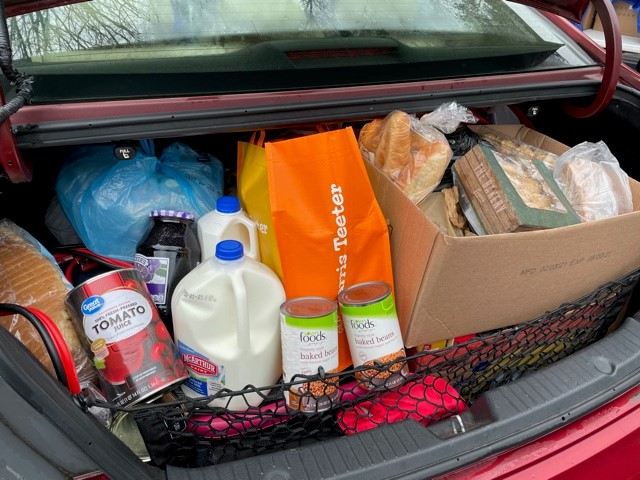by Lisa Biordi, volunteer
One year ago, COVID-19 was declared a pandemic by the World Health Organization. While life changed for all of us, many of our most vulnerable have experienced the most dire effects. According to the US Census Bureau, 1 in 3 households struggle to pay usual household expenses, while 1 in 7 struggle to buy food.
A large percentage of our clients are elderly or single parent families, and many clients are too ill to work. Most of our clients are the “working poor,” working two or three part-time jobs to try to make ends meet.
According to the Food Bank of Central and Eastern North Carolina, about 16% of the total population in the area “struggle to access nutritious and adequate amounts of food on a regular basis.” There is a chance someone you or your children knows suffers from food insecurity.
The Cupboard has witnessed the devastation imposed by COVID up close – we have seen an increase of 36% in the number of families requiring food assistance and a 28% increase in number of client visits.
The most dramatic increase has been the need for track out bags for school children. Demand for track out bags has increased almost 400%. As schools shifted from in person classes to remote learning at home, many children lost their access to school meal programs. The Cupboard increased the distribution of track out bags from monthly to every two weeks. In 2020, the Cupboard gave out 2,143 bags. While most of the items in these bags were donated, the retail value for that amount of track out bags is estimated to be $53,575.

While the Cupboard has seen an increase in need, we also have experienced an outpouring of generosity from our community, partner organizations and recurring donors. This is especially important: according to the US Department of Agriculture, the cost of food has increased an average of 3.5%, with dairy prices up over 4% and meat prices skyrocketing by almost 10%. The ongoing scarcity of fresh produce and meat has forced the Cupboard to increase expenditures on these items. And with stay at home restrictions, school closings and social distancing, most of our food drives and fund raising events last year had to be cancelled – so donations from the community were appreciated more than ever.
COVID has affected the Cupboard in other ways. After stay at home orders were issued, the Cupboard raced to implement changes to be able to safely and efficiently continue its mission to provide supplemental food to those in need in Southern Wake County.
The most pronounced change has been in how food is distributed. Rather than coming inside the Cupboard to check in and receive food and other services, clients are directed to drive through the parking lot. Clients park and stay in their vehicles while volunteers take their information and evaluate their needs. Then other volunteers load their vehicle with food. Our distribution volunteers work outside through all temperatures and weather – heat, wind, rain, sleet, cold – with good humor and compassion. Cupboard volunteers, at their own expense, also deliver food to clients who are unable to drive to distribution, whether due to illness, high COVID risk or a lack of transportation.
Other operating procedures put into place to minimize the risk of COVID include: restricting the number of volunteers serving at any one time; performing temperature checks on all workers entering the Cupboard; providing masks, gloves and hand sanitizer for all workers; and hiring professional cleaners for weekly cleaning of Cupboard premises (volunteers previously assumed cleaning duties). We have also had to suspend blood pressure checks (which has demonstrably saved clients lives), children’s book giveaways, and nutritious recipe demonstrations.
It has been a very tough year, especially for the marginalized. According to the Congressional Research Service, “the largest increases in unemployment rates since the onset of the pandemic in 2020 have been young workers, women, workers with low educational attainment, part-time workers, and racial and ethnic minorities.” These demographics are a large percentage of the Cupboard’s clientele.
We are proud and humbled that we are able to help others during this incredibly difficult time, and we are so very grateful to the community for their generosity supporting our mission – to provide supplemental food and referral assistance to those in need. A big thank you to all of you.
